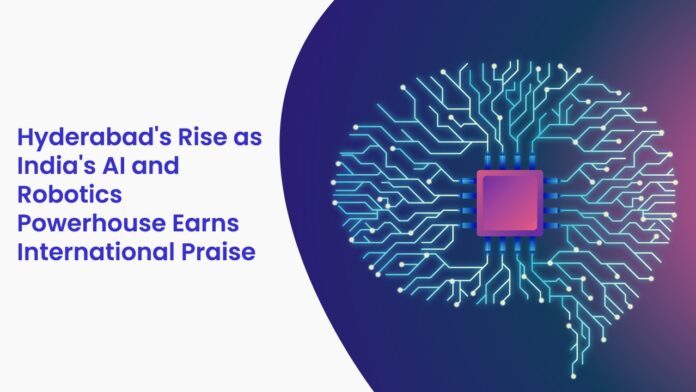The international spotlight on Hyderabad and India’s tech prowess marks a significant moment. As Hyderabad continues its ascension as a technology hub and with the potential of AI and robotics in India becoming more evident, it seems the nation is poised for a digital revolution, with Hyderabad at its forefront.
Hyderabad’s technology landscape is undergoing a remarkable transformation, with global experts placing it on the map as a leading contender for India’s hub for artificial intelligence (AI) and robotics. Renowned specialists from the United States, during recent interactions, have recognized the unparalleled growth and strides made by India, especially highlighting the contributions of Telangana state.
In a media dialogue held in Boston, USA, experts were effusive in their praise for the southern city. They underscored Hyderabad’s potential, stating that it’s swiftly closing in on Bengaluru’s reputation as India’s primary tech epicenter.
Ann LaFrance, vice president of the International Institute of Communications, played a pivotal role in this conversation. Speaking to the international media, LaFrance emphasized the dominant role that Indians have begun to play in tech firms across the U.S. This enriching dialogue was part of the ‘Innovations in Tech Policy and Navigating Artificial Intelligence’ tour. The session was an initiative hosted by the US Department of State’s Foreign Press Centre and the Meridian International Centre.
LaFrance was particularly vocal about the massive tech imprint Hyderabad has begun to make on the global stage. The city, which hosts titans of the industry such as Amazon, Google, Facebook, and Microsoft, is not just a hub of tech activity, but a beacon of innovation. In LaFrance’s words, the city’s dynamic talent pool combined with its burgeoning infrastructure points to a future where even more significant investments in sectors like AI, robotics, and machine learning are inevitable.
India’s legislative measures, particularly the recent introduction of a data protection law, were also touched upon in the discussions. LaFrance provided a comprehensive global perspective by drawing parallels and citing examples from around the world. She mentioned the EU General Data Protection Regulation 2016, the Draft EU AI Act, AI Liability Act 2021, and the Biden Administration’s Blueprint for an AI Bill of Rights 2022 among others. This array of global legislation not only underlines the evolving legal dynamics around AI but also emphasizes the urgency of addressing data flow and protection in the age of AI and robotics.
Amidst the AI chatter, the realm of robotics was not left behind. Dr. Matthias Scheutz, an esteemed professor of computer and cognitive science from Tufts University in Boston, threw light on the commendable strides India has taken in both AI and robotics. Dr. Scheutz stressed on India’s existing strong IT foundation that serves as a solid backbone to further its ambitions in the robotics sector. He added, “India has all the ingredients needed to fortify its robotics industry.”
Additionally, Professor Scheutz mapped out potential avenues where robotics can be further integrated. He identified sectors such as automotive, defense, space, textiles, and manufacturing as prime candidates for increased robotic applications. He was optimistic about India’s potential, expressing confidence in its capabilities to become a key player in the robotics sector at a global level.




